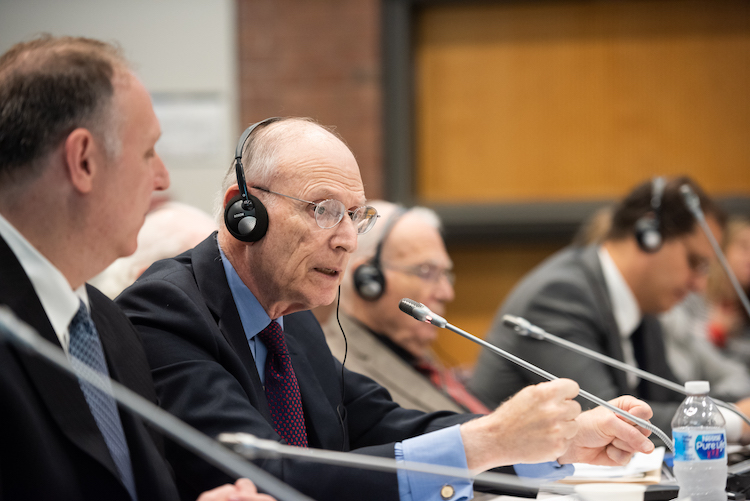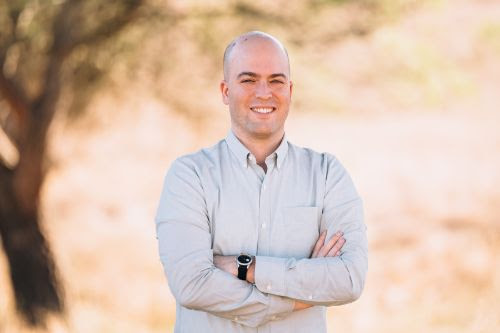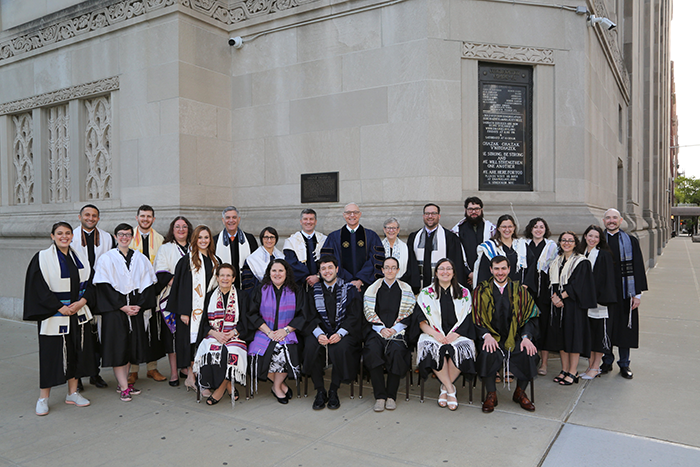Your Daily Phil: Claims Conference secures pensions for Leningrad siege survivors + SpaceIL cofounder’s virtual biopsy moonshot
Good Wednesday morning!
Jewish college students are now able to report antisemitic incidents on campus through a new website, ReportCampusHate.org, a joint effort by Hillel International, the Anti-Defamation League and the Secure Community Network, a spokesman for the campus organization told eJewishPhilanthropy. During the 2020-2021 academic year, Hillel International documented 244 antisemitic incidents, both online and on campus.
The three groups will help students report incidents to police and to their schools, and will offer or connect students to emotional support if necessary. The website will also gather data that will help the organizations analyze trends in antisemitism.
“Students who experience antisemitic incidents on campus often feel alone and unsure of how to respond,” said Adam Lehman, president and CEO of Hillel International. “Our goal is to connect these students to Hillel professionals to provide the support they need and to help empower them to address these issues in their campus community.”
BREAKTHROUGH MOMENT
Claims Conference secures pensions for Jewish survivors of the siege of Leningrad


Claims Conference
Some 6,500 additional Jewish Holocaust survivors are now eligible to receive pensions from the German government due to advocacy from the Conference on Jewish Material Claims Against Germany (Claims Conference). For five years, the Claims Conference had been negotiating on behalf of three groups in its annual sessions with the government of Germany, Special Negotiator Stuart Eizenstat, who is also the former U.S. ambassador to the European Union, told eJewishPhilanthropy’s Helen Chernikoff.
Newly eligible: “I started as special negotiator in 2009,” Eizenstat, the head of the international practice at the law firm Covington & Burling, said. “Since then, we have worked to add more and more categories of people as Holocaust victims, and to increase the amounts of the payments.” The groups newly receiving pensions are survivors of the siege of Leningrad, which lasted from September 1941 to January 1944; Jews who hid in the south of France but were able to venture out into public during the day; and Romanian Jews who weren’t forced into ghettos but had the trauma of worrying they might be turned in to the government, a Nazi ally. In 2009, the siege survivors were granted a one-time payment.
A troubled period: Founded in 1951 by representatives of 23 Jewish organizations, the Claims Conference has secured about $90 billion in compensation and restitution to Jewish victims of the Nazis. In 2009, the conference discovered signs of fraud, and in 2010, the FBI announced an indictment against 11 employees and other individuals. Semen Domnitser, a former director of the conference, was the highest-ranking employee to participate in the fraud, estimated at $57 million, and was sentenced to eight years in prison. Eizenstat served in the Carter and Clinton administrations, and was former President Bill Clinton’s special representative on Holocaust-era issues, negotiating agreements with European countries including Germany and Austria on property restitution, slave labor payment and art recovery.
‘Traumatic conditions’: The coronavirus pandemic played a coincidental role in securing pensions for those in the added categories, Eizenstat said. The Claims Conference arranged for the German negotiators to do a Zoom session with a survivor in Florida, who had survived the siege of Leningrad as a child, in order to mitigate the alienating effects of online communication. About 50,000 Holocaust survivors already receive monthly pensions averaging €580, or $673. The amount allocated for the new pensions is lower, at €375, or $435, because these new recipients of reparations suffered relatively less than others did. “These were traumatic conditions, but not the same conditions as those who were in concentration camps, in closed ghettos or in hiding,” Eizenstat said. That discrepancy in the amount of suffering is also the reason Germany resisted providing pensions for these groups, Eizenstat added.
MOONSHOT
The newest challenge for SpaceIL co-founder — virtual biopsies


ANDRIA GRODZINSKY
Two years ago Yonatan Winetraub watched with anticipation as the Israeli spacecraft Beresheet, launched by the Israeli organization SpaceIL, which he co-founded, crash-landed on the Moon. A second mission is in the works, but today the ambitious 34-year-old Israeli engineer told Jewish Insider’s Tamara Zieve that he has his sights set on a new — and entirely different — challenge, having just been named a winner of the $1.25 million U.S. National Institutes of Health Director’s Early Independence Award.
Fast track: The award offers an on-ramp for talented junior investigators to be able to carry out independent research by allowing them to bypass the traditional post-doctoral training program and helping them start their own labs.
Bypassing biopsies: Winetraub, who recently received his Ph.D. in biophysics from the Stanford University School of Medicine, will put the $250,000 per year that he has been awarded for the next five years toward developing technology that will enable doctors to “read” skin tumors without the need for physical biopsies, but rather with a virtual one.
Less invasive: Winetraub explained that today, a biopsy is needed to ascertain whether a person has skin cancer. “It’s invasive and you can’t do it everywhere — especially in elderly patients where sometimes they get a lot of spots that are suspicious,” he told JI on Tuesday. His research focuses on utilizing Optical Coherence Tomography (OCT) and machine learning to create virtual histology tools to non-invasively image cancer at a single-cell resolution.
Looking ahead: He hopes that the same device can eventually also be used for brain tumors. “It’s the same issue there. You don’t want to take everything out, you just want to take the tumor out — so doing this virtual biopsy to get those images that the doctors need in order to determine if there is cancer or not is really important.”
Bonus: The SpaceIL team is working on ideas for its second mission to the Moon, which is scheduled for 2024. Winetraub’s personal favorite is the vision of trying to grow a plant on the Moon. “Chickpeas might be part of the mission,” he told JI. But that “remains to be seen.”
RELATIONSHIP MEANS SHOWING UP
Quietly eyeing the exit door or seeking renewal


HUC-JIR/Richard Lobell
“The second pandemic-era High Holy Days in North American Jewish life is behind us. Once again, rabbis in congregations and Jewish organizations across the country successfully found new and creative ways to bring their communities together during this sacred time. But even if your synagogue or Jewish organization made this process look seamless on the outside, you can be sure that on the inside, the work is demanding and grueling,” writes Rabbi Lewis Kamrass, president of the Reform movement’s Central Conference of American Rabbis, in an opinion piece for eJewishPhilanthropy.
Heading towards crisis: “Congregations and organizations in some ways operate like small businesses; they have to bring in enough revenue to meet their expenses and make payroll, and they have to keep their stakeholders (such as congregants or donors) satisfied and engaged. But unlike many businesses, these institutions have often had to respond to the economic, logistical and cultural shocks of the pandemic without key infrastructure, such as H.R. departments, I.T. staff and other talent on a deep staff bench. Even large congregations are generally understaffed for their own level of program and activity. The end result is that rabbis themselves face a large and ever-growing list of demands and responsibilities, which may be pushing us toward a major crisis within Jewish institutions.”
Facts on the ground: “Here are the observable facts for congregations and organizations that rely on rabbis to lead them or to serve in any role on their staffs: a) we will be facing an unprecedented number of rabbinic positions being vacated in the next years as the baby boomer generation reaches retirement age; b) for the last decade, we have seen increasingly smaller numbers of those entering rabbinical school and being ordained. Both of these trends suggest that the roles that many institutions are counting on their rabbis to fill right now may be left vacant as the overall number of rabbis shrinks.”
MERELY INCIDENTAL
Gifting through a foundation offers naming rights advantages


CJP’s Kraft Family Building (April 2018); courtesy CJP
“For individuals and families with private foundations, the first rule of operation they learn is: ‘Thou shalt not personally profit from your relationship with the foundation.’ Because of the strict self-dealing rules of section 4941 of the Internal Revenue Code, almost any financial benefit to a donor or insider from a private foundation’s activities, whether that benefit is direct or indirect, is forbidden,” write Jeffrey Haskell and Jennifer E. Bruckman, legal officers at Foundation Source, in an opinion piece for eJewishPhilanthropy.
Naming rights: “So how is it that private foundations can make grants to nonprofit organizations and receive naming rights on behalf of an individual such as their founder or CEO? And why do it through a private foundation at all, rather than from one’s own resources?”
Merely incidental: “While it’s true that private foundations are generally not allowed to provide benefits to donors, the tax rules mainly treat public recognition, including naming rights, as a benefit that is ‘merely incidental’ to the charitable purposes served by the grant. This seems counterintuitive. Staples paid almost $120 million in 1999 to have its name on the Los Angeles arena now known as the Staples Center for a 20-year period. Surely, naming rights have real monetary value, and having a private foundation pay for those naming rights to benefit an individual or corporation affiliated with the foundation certainly seems like a self-dealing transaction.”
Worthy Reads
In the Harvard Business Review, Rae Ringel offers eight tips for employers trying to make sound hiring decisions despite the challenges of remote interviewing. Ringel emphasizes the importance of personality and authenticity, urging interviewers to focus on emotional intelligence, to embrace the intimacy that’s specific to screen-to-screen interaction and to “get real” about the impacts of the pandemic. “The most outstanding candidates are bound to receive multiple offers these days,” Ringel notes. “The way you, the interviewer, present yourself — how you dress, what appears in your background, and your own cadence, tone, and choice of interview questions — will determine how your prospective employees view your organization.” [HBR]
Gutting It Out: Philanthropy has a bad habit of declaring victory when it has only won a battle, not the war, Shane Murphy Goldsmith writes in Stanford Social Innovation Review. The problem is not a lack of will or even ideas, but a disinclination to follow through with thorough implementation, as when Los Angeles County allocated millions of dollars to green energy programs, and then never spent the money. Implementation is complicated, requiring attention to detail, relationships with government insiders and attention from the press to sustain public interest. “Implementation requires understanding how to build, direct, and sustain power,” Goldsmith concludes. [SSIR]
Community Comms
Be featured: Email us to inform the eJP readership of your upcoming event, job opening, or other communication.
Word on the Street
Bahrain’s undersecretary for political affairs was in New York earlier this week to meet with Jewish leaders… The Centers for Disease Control and Prevention published a study conducted by the medical committee of the Camp Ramah network, highlighting the camps’ successful safety measures for avoiding the spread of COVID-19 this past summer… The American Jewish Committee released a Spanish-language edition of “Translate Hate,” their widely used glossary of common antisemitic terms and tropes… The Anti-Defamation League’s national “Walk Against Hate” will take place Sunday, Oct. 10, in communities across the U.S…. The Wexner Foundation opened applications for the next cohorts of the Wexner Heritage Program and Wexner Field Fellowship… The Boston-based Barr Foundation announced third-quarter grants totaling $30.9 million in support of organizations working in the areas of climate change, education, sector effectiveness and the arts… Only eight billionaires on the 2021 Forbes 400 list received the magazine’s top philanthropy score… Apple implemented Mail Privacy Protection and other new features that will fundamentally change how nonprofit organizations conduct email outreach, including fundraising…
Pic of the Day


View Pictures/Universal Images Group via Getty Images
City of London planners overwhelmingly rejected a proposal to build a 48-story block-long tower next to Bevis Marks, the U.K.’s oldest continuously used synagogue, over concerns that it would overshadow the shul.
Birthdays


Kelly Lee Barrett/Getty Images
Actress Olivia Thirlby…
Owner of Lancaster, Pa.-based industrial supplier Samuel Miller & Son, Rosanne Selfon… Awarded a Ph.D. at University of California San Diego in space science, consultant to NASA and author of many science fiction novels, David Brin… Justice of the Supreme Court of Israel, Uzi Vogelman… CEO at Hillels of Georgia, serving 24 campuses throughout the state, Elliot B. Karp… Bexley, Ohio-based real estate agent, Jan Kanas… NBC correspondent and best-selling author, Jonathan Alter… Spiritual leader of Congregation Ner Tamid in the Las Vegas suburbs, Rabbi Sanford Akselrad… Former member of the New Jersey General Assembly, now the managing director of Quest Associates, Joel M. Weingarten… Mayor of Jerusalem since 2018, Moshe Lion… Attorney in Lakewood, N.J., Samuel Zev Brown… Member until last year of the Florida Senate, Kevin J.G. Rader… Candidate for governor of Arizona, he is a member of the Arizona House of Representatives, Aaron Lieberman… CEO of Community Security Service, Evan R. Bernstein… Deputy chief planning officer at UJA-Federation of New York, Hindy Poupko… Senior advisor for Israel Strategies at the William Davidson Foundation, Deena Pulitzer… Director of community outreach and constituent affairs for the governor of Nevada, Madeline S. Burak… Past chairman of ARZA, and representative of Reform Judaism in the Jewish Agency and the World Zionist Organization, Rabbi Stanley Davids…
Email Editor@eJewishPhilanthropy.com to have your birthday included.








